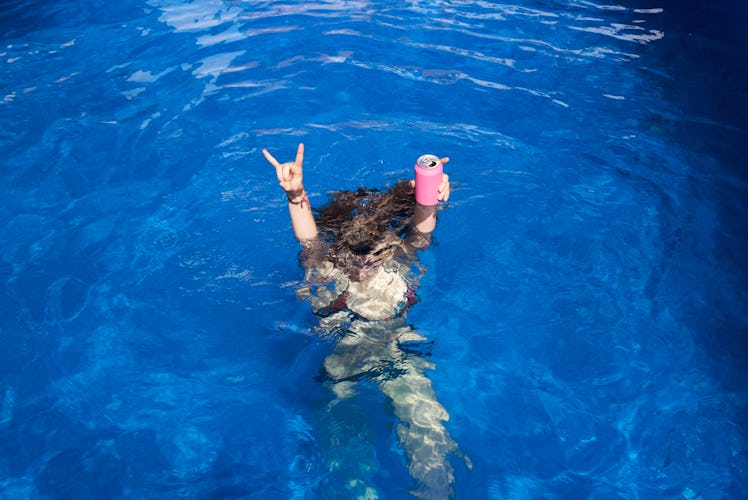
Drinking Flavored Seltzer May Help You Kick A Soda Habit, But Here's What To Watch For
It seems like everything is bad for you these days. From soda to fast food to the world turning into a burning ball of hot lava faster than you can say "climate change," the idea of being healthy can seem daunting. And then you actually try to make a healthy, wholesome choice, and it turns out that that might be bad for you, too. Plenty of supposedly healthy things are actually unhealthy in disguise, which is why some people have been wondering whether flavored seltzer is bad for you or not.
When you're trying to find healthy drink alternatives to water (because yawn), it's pretty disheartening to find out that basically everything is bad for you. From sugary juice to chemical-injected soda, there are a ton of beverages that do way more harm than good.
Luckily for everyone, seltzer water doesn't do much harm at all. Of course, there are plenty of different types of seltzer water, and the more flavored or sugar-filled they are, the worse for you they're going to be. But in general, seltzer water is a far healthier alternative to most sodas and even most fruit juices.
The greatest myth around seltzer water has to do with the calcium in your bones.
This derives from a greater fallacy that people have around the idea of carbonation leaching calcium from your bones and increasing the risk of osteoporosis. In truth, Business Insider reports that there appears to be no scientific proof that a carbonated drink is detrimental to your calcium levels at all. But this isn't the only false claim that several websites make about the negative health effects of drinking seltzer water.
Another carbonation-related rumor has to do with the enamel on your teeth, and unfortunately, that concern holds more water (yay puns!) than the calcium myth.
Seltzer water can technically wear away at your tooth enamel, though not as destructively as soda.
Because of the carbonation process, the acidity of seltzer water is around the same as that of a fruit juice, which can also lead to some wear and tear on your chompers. An important note, though, is that flavored seltzers (particularly lemon, lime, and grapefruit) are even more damaging than regular seltzers because of the added citrus and acidity.
Even so, the effects that seltzer water may have on your teeth are pretty mild, and shouldn't pose any long-term problems as long as you take care of your teeth with the proper dental care.
Another potential side effect of drinking seltzer water on the reg — that is actually true — has to do with your stomach lining.
People who suffer from irritable bowel syndrome (IBS) — a condition that causes recurring gas pains and diarrhea or constipation — shouldn't really drink seltzer water, like, ever.
Sorry, guys. According to CNN, the only potentially legitimate health concern that seltzer water may pose is that it can further upset an already irritable tummy, because of all the bubbles, and in turn, the release of carbon dioxide that leads to bloating and gas. If you do have IBS, you're definitely better off sticking to plain ol' water, or at least talking to your doctor about the pros and cons of drinking seltzer water.
If you're having trouble getting proper hydration and you just can't stand drinking plain water all day, then seltzer water is a fantastic (and healthy) option to sub in for water on occasion. If you're not a seltzer fan, coconut water is another nutritious option to choose in lieu of opting for a soda or fruit juice.
Of course, most of these things are completely fine for you in moderation. There's nothing deadly about having a soda on occasion, or drinking juice in the morning if you want to. It's all about being aware of what you're putting into your body, and staying on top of your physical health as often as possible.